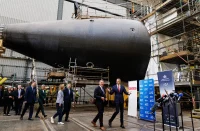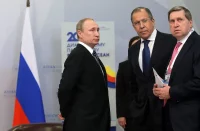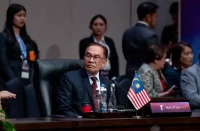The events in Central Asian countries very rarely attract massive international media attention. It does not means that nothing happens here. In the last decade of May, the third annual meeting of deputy foreign ministers of Central Asian states (an event organized by the United Nations Regional Centre for Preventive Diplomacy – UNRCCA and held in Ashgabat, Turkmenistan) was focused on enhancing regional cooperation and sustainable development. In the same time, the First Deputy Minister of Foreign Affairs of the Republic of Tajikistan Mahmudjon Sobirov received the U.S. Principal Deputy Assistant Secretary of State for South and Central Asian Affairs Geoffrey Pyatt. Mr Pyatt expressed desire of the US side to facilitate trade between Central and South Asia. In his turn, M. Sobirov expressed hope that the US will also support the implementation of energy projects in Tajikistan that would contribute not only to the economic development of Tajikistan, but to the entire region, since these projects will allow Tajikistan to export energy to the countries of South Asia. In another part of the world, Europe – Germany announced that it will gradually close all nuclear reactors by 2020. Likewise, Switzerland. But until to this “green future”, existing energy alternatives cannot yet cover the energy needs of the European, American or Chinese. In this context, the fuel resources of the countries of Central Asia makes this space an issue for the diplomatic front where the battle is becoming increasingly fierce. Whether we speak of the European Union or China, the basic idea remains the same and was sound enough: diversify supplies in order to reduce structural dependence on Russia. In this discussion we will limit to the moves from the European side. Projects started, projects delayed and too few concrete results. Moreover, history seems again from Russia’s side. Unrest in North Africa and the Middle East increases the need of European Union to find new solutions to ensure energy needs. So no wonder there is a European Union diplomatic offensive on the all possible fronts.
Nabucco vs South Stream
When talking about the two major energy projects of European Southern Corridor, we mainly observed that Western European diplomacy has always tried, at least in public, a delicate balance by supporting both projects. Diplomats and officials from Austria, Germany or even Italy have defined open the option to support both projects. What mattered in the price of gas imported from Russia. In contrast, the countries of Eastern Europe, namely Bulgaria and Romania have tried without much success a dual approach. Berlin, for instance, was (and still is) interested in opening new pipeline routes out of Central Asia in order to diminish the European Union’s dependence on Russian energy. German diplomats also were on the lookout for ways to boost trade in ways that benefited German manufacturers. In addition, the German military was eager to retain access to a military base at Termez, near the Uzbek-Afghan border. More, the meltdown of Kazakhstan’s banking sector in early 2009 cost German firms an estimated 500 million euros in lost investments, 300 million euros of which will have to be borne by German taxpayers. But the economic debacle did nothing to diminish Merkel’s enthusiasm for engagement with Astana. But from Moscow the diplomatic offensive of Germany was overlooked, given the many economic and political projects common to both countries. In contrast, many of Romania’s diplomatic contacts in Central Asia (even though concrete results have minor) were born from the Kremlin a grumble; however, the relations between the two countries are not the happiest. Romanian diplomacy seems unable to adapt in real time to the dynamic changes in the international community. Moreover, the Romanian diplomacy is becoming more like Japanese soldier who remained on the barricades and after the war. Is that good? It’s bad?
However, following the announcement that the Nabucco project is delayed due to lack of resources, President Basescu also met in early May with his Turkmen counterpart, Gurbangulî Berdîmuhamedov, came in a three-day official visit to Romania. The two presidents expressed their support for the diversification of energy supply and transport routes as a key precondition for regional and global energy security and agreed to continue developing mutually beneficial energy partnership. The sides emphasized the importance accorded to supplies of Turkmen natural gas in the European direction, including the priority projects for Romania, Nabucco and AGRI. Notice that Turkmenistan’s largest gas producer in Central Asia, the second from the former Soviet Union after Russia, and the fourth holder of world gas reserves, as calculated by Soviet geologists. Since 1991, Turkmenistan’s independence, until last year, Russia held the gas purchase virtual monopoly in this country. Turkmenistan is considered among potential gas sources for Nabucco. Then it will be… If it will be ! Nabucco was meant as an alternative to the monopoly on supplying Russian gas to Europe. But the opening of the Nabucco pipeline has been postponed for two-years. According to EU Energy Commissioner Guenther Oettinger, this is due to the fact that the EU has not closed a sufficient number of contracts with manufacturers. Construction costs for the project, which has been in development since 2002, will likely reach 15 billion euros. Initially the gas was to have been supplied to the EU from Iran, but in connection with the conflict over the nuclear program of that country this plan was cancelled. Brussels refused Iranian gas in favor of fuel supplies from Turkmenistan and Azerbaijan with whom negotiations continue to be difficult, and specific agreements have not yet been signed. One of the initiators of Nabucco project was a President George W. Bush. Perhaps it was not his idea, but who suggested him is clear knew that the Silk Road well the moral valid for hundreds of years: no matter who produce silk, but who controls the silk road to the consumer. As is the case of natural gas (and the Russia advantage here goes). Currently, not all Russian gas company Gazprom that it goes to Europe comes from Russia. In other words, Russia wants to control the gas delivery, not only production. As diplomatic efforts of the Russian Federation in close proximity, it is enough to take a brief look on the agenda of the President, Prime Minister and Russian Foreign Minister to see that they are almost the rule. Moreover, the media reported that Russian company Gazprom has tempted practically all countries/companies participating in Nabucco, trying to determine to abandon the project. On June 29, 2010, Gazprom signed a contract with Azerbaijan (first of only 500 million cubic meters / year), after a few years ago signed a contract with Turkmenistan more important. If Nabucco appears to have entered clinical death nor South Stream, Russian alternative project does not seems to feel better. Moscow preferred to invest heavily in North Stream (probably due to concrete results), in partnership with Germany. The economic crisis has weakened the enthusiasm for South Stream, although thanks to premier Putin the agreements with European partners have been signed. Whether we talk about lack of financial resources or lack of competitor Nabucco, South Stream alternative remains an ace in the sleeve, even if Russia does not seems a priority at this time.
Looked at closely, European diplomatic offensive in Central Asia is like a pilgrimage to Mecca of energy resources. But is this the most effective approach? According to World Politics Review: “If Europe really wants to try and solve energy security problems, then it is really necessary to rethink strategically on a common energy policy. Instead of trying to attract producer states by offering a security guarantee that the EU can’t provide, officials in Brussels should concentrate their political and diplomatic efforts towards the massive demand side of the pipeline. That means working with the major energy consumer of tomorrow: China”. More specifically, it means “think outside the box”. To apply pressure to producer states, Europe must forge a shared consensus with Beijing to safeguard demand-side interests, rather than pretending it has the military hardware or resolve to secure wells, pipelines or wobbly producer states. “That’s where Central Asia, the main stage of the potential Sino-European energy relationship, comes in. Beijing should encourage projects that give the EU leverage against Moscow and, more importantly, that reduce the prospects of price collusion between Russian and Central Asian producers” said Matthew Hulbert for World Politics Review.
AGRI – compromise or complementary solution?
The project AGRI (Azerbaijan-Georgia-Romania Interconnector), whose steering committee met on May 26 to 27 in Bucharest, could makes Constanta city a hub for liquefied natural gas from the Black Sea. It would be against European interests, undermining the Nabucco or a complementary solution? A compromise ? AGRI is the project of a natural gas transportation system from Azerbaijan to Central Europe. Azerbaijani Sangachal terminal gas on the coast of the Caspian Sea to be pumped by pipeline to the Georgian port of Kulevi, Black Sea, where it provided construction of a liquefaction plant. From here, liquefied natural gas (GNL) will be loaded and transported in special tanker ships in the port of Constanta, from where, after re-gasificatione, will be introduced in the Romanian pipelines. After completion of Arad-Szeged pipeline – in this case, after will be possible to pump gas from Romania to Hungary – a significant part of the volumes of gas transported through AGRI will reach the Central European market. But AGRI exclude Turkey from the transit of Azeri gas to Europe. Therefore, Ankara is hostile to any regional energy plan that undermines its role. Moreover, analysts say that like other projects of the Southern Corridor, AGRI transit depends on Georgian territory. Georgia’s fragile link of project, will host the most sophisticated and expensive system AGRI: Liquefaction of Kulevi port. However, given Moscow’s aversion to the key role of Georgia in Caspian oil transit the probability of technical failure Georgian segment is appreciable. Of course it would be a solution for Eastern European, but do not have major strategic impact in the European Union.
***
Meanwhile, not insignificant, the G8 meeting in Deauville has shown that apart from bilateral diplomatic efforts in the Central Asian, the international community wants stability and peace in this vital area. Hence the clear intention of resolving the conflict in Nagorno_Karabach. After Deauville statement, political analyst Mubariz Ahmedoglu said at a news conference that: “The statement clearly states the importance of adopting the basic principles at the Azerbaijani, Armenian and Russian presidents’ meeting to be held in Kazan on June 25.” “There are features distinguishing Deauville statement from the previous documents. The text is accurate, concrete, and clearly reflects the resolution plan” he said. According to Ahmedoglu, based on the statement the basic principles will be adopted and after that a practical resolution may begin by signing a great peace agreement and adopting a road map. “Deauville statement by the presidents can create conditions to sign a serious document on resolution of the Nagorno-Karabakh conflict” Ahmedoglu said. He said the Nagorno-Karabakh conflict has influenced not only Azerbaijan and Armenia’s fate, but also the entire region. Even Georgia considers the Nagorno-Karabakh conflict the most important problem in the region. And the implications in the context of the above discussions are easily identified.
Gabriela Ionita is editor to Cadran Politic, analyst in the field of International affairs (mainly connected with the Russian Federation and Community of Independent States). Also maintains a frequently updated blog Power&Politics World. She graduated from the National School of Political and Administrative Sciences – Bucharest, specialization in Communication and Public Relations. Ms. Ionita lives in Bucharest City.
ORIENTAL REVIEW thanks Ms.Ionita for her exclusive contribution.














Pingback: The European Diplomacy, Energy Security and Central Asian Stake | Power&Politics World